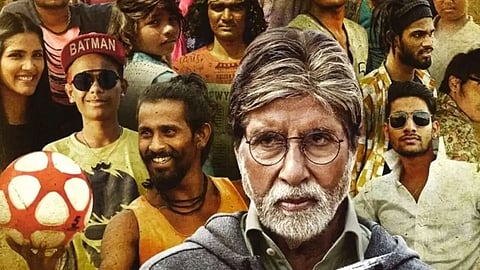Bollywood has always been a fertile ground for escapism, consistently failing to provide a sneak peek into Indian society. Whether it is via the imposition of conventional beauty standards, or through the uncritical reflection of a class-driven society, it provides a beautiful escape from harsh ground realities. Cinemas did show the romanticism of breaking the barriers of class, but always fell short of portraying caste, which was often a sticky topic to deal on 70mm screen by an industry dominated by upper class and castes.
Travesty Of Bollywood
Caste remains a taboo in Bollywood. It is at best treated gingerly. Mostly, depictions follow insensitive social norms.
Honour killings, caste brutalities, caste-based violence have still not found space in mainstream Hindi cinema, despite mature treatments in movies like Jhund and Vaikunth that acknowledge caste struggles and distinguish between caste and class.
“Jabb bolti nahi hai, toh kaise pata ki Brahman ki bachhi hai?”
“Itni gori jo hai…Brahman hi hogi.”
No, these are not dialogues conjured out of thin air for the sake of this article. Actors are hero-worshipped and Bollywood is an integral part of our culture. It is often expected that a medium that reaches most households across the country would remain unproblematic. Instead, it blatantly endorses biases. The proof? The above lines are taken from Bajrangi Bhaijaan, one of the highest-grossing movies of 2015. They not only solidify ideas of unrealistic beauty but also link uncritically it to caste, even as they hold a mirror to existing social realities.

Similar to casual sexism, the normalisation of caste jokes in Bollywood has made casual casteism the new normal. A punchline scripted at the cost of someone’s social identity is rampant in the industry. What this glamorous world misses is that the viewership of every movie runs among several segments of society and that many of its viewers do not have the critical resources or privilege to unpack layers of meaning. First, there is the percolation of cultural hegemony, and second, there is the proliferation of the same. The outcome is, more often than ever, that Dalits are stripped of their basic rights to a decent life. Bollywood has portrayed ideas of housing issues for Dalits as a passing joke, for example, which not only trivialises the narrative but also reinforces the stigma of not allowing a Dalit to stay on the same plot as a caste Hindu in India. Naveen Bharti’s Harvard study using 2011 census data of 800 people brought to the limelight the segregation carried out among people under the banner of development and urbanisation. The study was carried out in Kolkata and it was found that there are several colonies in the metropolitan city where only upper-caste Bengali Hindus live and no Dalits are allowed. The assumed harmless punchlines and scripts in Bollywood result in the othering of a major chunk of the population on grounds of being inferior.
On the contrary, OTT platforms have recently produced content that takes into consideration sensitive issues and presents them to the audience with a nuanced view of the reality of stratification in our society. One of those series was Unpaused: Naya Safar, where the final segment, Vaikunth, revolved around a crematorium worker. Crematorium workers in India are invariably from lower castes. Covid-19 was one of the hardest times for these unappreciated and unacknowledged workers. It has been one of the few feature films to appropriately highlight social ostracisation, police violence and even accommodation issues faced by them. Even though things were watered down on the screen, the film posed the right questions: will these communities ever come out of their cycle of generational occupation? When are they going to get housed like the rest of us? When will we finally consider them ‘clean’ enough to be inclusive? But the paradox lies in the fact that OTT platforms are still no match to the reach Bollywood has. When the whole world was “working from home”, and doctors and policemen were praised as frontline warriors—the drowsy face of crematorium worker Avnish, who works day and night, is unworthy of praise. During the Covid-19 second wave, the condition of crematorium workers worsened when even family members refused to touch dead bodies of their near and dear ones, and the burden fell upon these people to cremate them, sometimes even free of cost. The physical and mental condition of the crematorium workers is at risk during every step of the process. There is the threat of transmissible diseases such as HIV, typhoid, cholera, and tuberculosis, along with Covid. Risk of infection and pain of working long hours causes mental breakdown. The reality is harsh and heart-wrenching; there is no statistic of how many of these workers died during the second wave.
The recent film, Jhund, the term, which means a flock, but is used as abuse for a group of uncivilised law-breakers, shows the real story of a group of slum dwellers and their journey from jhund to Samooh—an international football team. Like the caterpillar transforms into a butterfly, their identity shifted from “criminal, drug addict, rule breaker” to a respected football team. It shows talent has no boundary, colour, caste, class or gender. For them, a ball holds the power to change the world. For the jhund, it was not a smooth journey, but rather a road full of thrones and new challenges, but football was their hope. In the journey, qualities like discipline, determination, teamwork and a passion for respectful existence were learnt. A central idea in all these movies was the concept of spatial segregation, which also aligns with Peter Bourdieu’s work on alienating sections of society on grounds of the land they acquire.

These attempts are a step in the right direction, even if they are isolated. Bollywood, the glamorous industry, is still largely unable to escape from the shackles of caste. Because the movies that try to venture into these topics seldom do well at the box office.